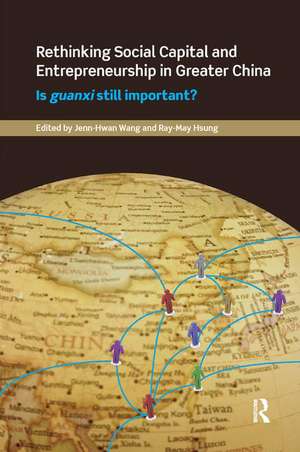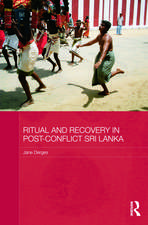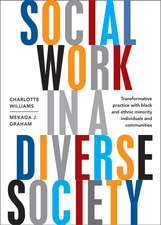Rethinking Social Capital and Entrepreneurship in Greater China: Is Guanxi Still Important?: Routledge Culture, Society, Business in East Asia Series
Editat de Jenn-Hwan Wang, Ray-May Hsungen Limba Engleză Paperback – 12 ian 2018
| Toate formatele și edițiile | Preț | Express |
|---|---|---|
| Paperback (1) | 469.34 lei 6-8 săpt. | |
| Taylor & Francis – 12 ian 2018 | 469.34 lei 6-8 săpt. | |
| Hardback (1) | 848.96 lei 6-8 săpt. | |
| Taylor & Francis – 19 mai 2016 | 848.96 lei 6-8 săpt. |
Din seria Routledge Culture, Society, Business in East Asia Series
-
 Preț: 310.14 lei
Preț: 310.14 lei -
 Preț: 264.59 lei
Preț: 264.59 lei -
 Preț: 436.14 lei
Preț: 436.14 lei - 26%
 Preț: 764.62 lei
Preț: 764.62 lei -
 Preț: 390.54 lei
Preț: 390.54 lei -
 Preț: 433.05 lei
Preț: 433.05 lei -
 Preț: 449.41 lei
Preț: 449.41 lei -
 Preț: 386.61 lei
Preț: 386.61 lei -
 Preț: 389.66 lei
Preț: 389.66 lei -
 Preț: 389.66 lei
Preț: 389.66 lei -
 Preț: 381.47 lei
Preț: 381.47 lei -
 Preț: 389.66 lei
Preț: 389.66 lei -
 Preț: 274.66 lei
Preț: 274.66 lei
Preț: 469.34 lei
Nou
Puncte Express: 704
Preț estimativ în valută:
89.83€ • 93.43$ • 75.28£
89.83€ • 93.43$ • 75.28£
Carte tipărită la comandă
Livrare economică 14-28 martie
Preluare comenzi: 021 569.72.76
Specificații
ISBN-13: 9781138477247
ISBN-10: 1138477249
Pagini: 268
Ilustrații: 13 Line drawings, black and white; 30 Tables, black and white; 13 Illustrations, black and white
Dimensiuni: 156 x 234 x 14 mm
Greutate: 0.45 kg
Ediția:1
Editura: Taylor & Francis
Colecția Routledge
Seria Routledge Culture, Society, Business in East Asia Series
Locul publicării:Oxford, United Kingdom
ISBN-10: 1138477249
Pagini: 268
Ilustrații: 13 Line drawings, black and white; 30 Tables, black and white; 13 Illustrations, black and white
Dimensiuni: 156 x 234 x 14 mm
Greutate: 0.45 kg
Ediția:1
Editura: Taylor & Francis
Colecția Routledge
Seria Routledge Culture, Society, Business in East Asia Series
Locul publicării:Oxford, United Kingdom
Public țintă
Postgraduate and UndergraduateCuprins
1. Introduction: Guanxi matters? Rethinking Social Capital and Entrepreneurship in Greater China Part I: Guanxi and Entrepreneurship in China 2. The Social Capital for Self-Employment in Transitional China 3. Guanxi-based Corporate Social Capital and Chinese Entrepreneurship 4. Guanxi Circle Phenomenon in the Chinese Venture Capital Industry Part II: Social Capital and its Transformation: Taiwan and Hong Kong 5. Social Capital and Entrepreneurship of Next Generation: The Case of the Koo Family in Taiwan 6. Network Capital and Li & Fung Group in Hong Kong: Four Generations of Inculcation and Inheritance 7. The Changing Corporate Social Capital and Its Implications of Semiconductor Industry in Taiwan 8. Social Capital and the Development of Taiwan’s Pharmaceutical Industry: Comparing Conventional and Biomedicine Firms Part III: Social Capital and Cross Border Linkages 9. Building Industrial Systems in China: The Networking of Taiwanese Machine Tool Firms in China 10. Guanxi and the Ancient Jade Trade: Cross-Border Antique Market in Greater China 11. Transnational Entrepreneurship and Social Capital: the Case of Rebuilding a Mazu Temple from Taiwan to Kunshan, China 12. Epoch Foundation: The Story of the Creation of a Social Innovation Network
Notă biografică
Jenn-Hwan Wang is a Professor in the Graduate Institute of Development Studies at National Chengchi University, Taiwan.
Ray-May Hsung is a Professor of Sociology at National Chengchi University, Taiwan.
Ray-May Hsung is a Professor of Sociology at National Chengchi University, Taiwan.
Descriere
Family networks and wider personal social relationships - guanxi - have long been held to be a significant factor making for the success of many Chinese family businesses, and guanxi is often seen as a special characteristic which shapes the nature of all business in China. This book re-examines this proposition critically, bringing together the very latest research and comparing the situation in different parts of "Greater China" – mainland China, Taiwan and Hong Kong. It considers entrepreneurship, venture capital, intergenerational succession, disputes, family businesses in different sectors of the economy, and particular family businesses.












